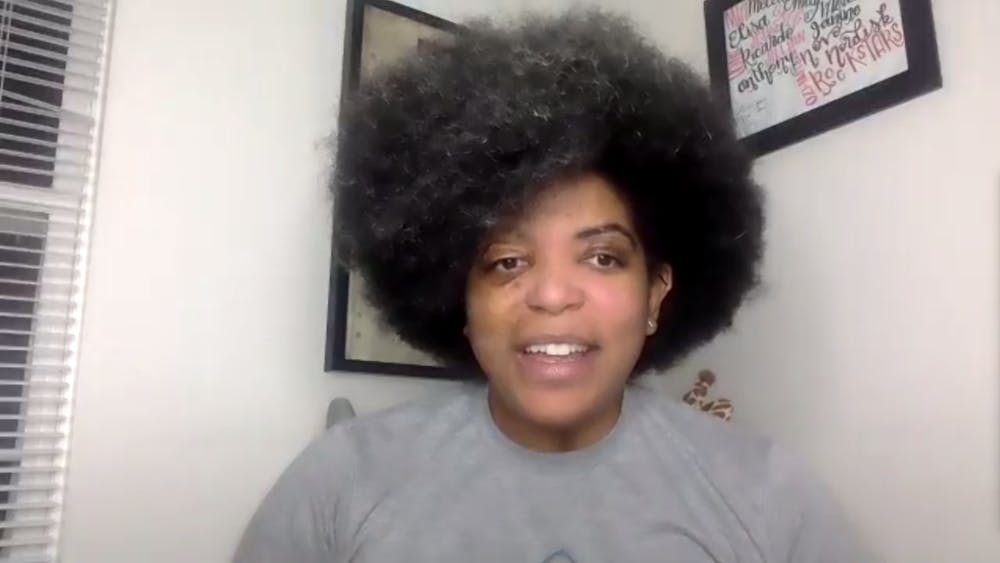IU professors and local activists discussed white supremacy, voter rights and the Black Lives Matter movement during a Thursday virtual town hall.
Panelists including activist Abby Ang, professor Luis Fuentes-Rohwer and national speaker Ash-Lee Woodard Henderson spoke during the event, which was the last of three nights of a series of speeches in the Social Justice in America Series presented by the Office of the Vice President for Diversity, Equity, and Multicultural Affairs.
This year's events were rescheduled from April to October and became virtual. Host Amrita Chakrabarti Myers, an associate professor of history and gender studies, said the inspiration for the town halls began after the murder of Michael Brown and the protests in Missouri in 2014, with the first occurring in 2015.
She then acknowledged the U.S. is a settler colonial nation built on Indigenous land.
"Indiana University is built on the ancestral homelands of no fewer than five indigenous nations," she said.
Myers said that the dialogue created by the event is important to embrace, especially on college campuses.
"We must engage in what I call tough talks on tough topics,” she said. “At the end of the day, what are universities for, if not to engage in dialogue so we can learn from one another?"
She also discussed the significance of this year's hall amongst the pandemic and the Black Lives Matter movement.
Performers from the African American Dance Company, one of three student performing ensembles within IU's African American Arts Institute, presented a special performance of the South African gumboot dance at the Conrad Prebys Amphitheater, donning rain boots and masks. The performance was titled "Our Bicentennial Movement" and was choreographed by professor Stafford C. Berry Jr.
"It was an opportunity to connect with our traditional African past," one of the dancers said.
Jeannine Bell, a professor in the Maurer School of Law and a nationally recognized scholar in policing and hate crime, was the moderator for the evening.
The first featured speaker of the town hall was Abby Ang, the founder and lead organizer of No Space for Hate. She discussed farmers markets, saying they are places where white supremacy is rooted. She emphasized the need for research efforts to deal with white supremacist threats in south-central Indiana.
She called universities "key battlegrounds" in the fight against white supremacy, saying that in 2019 there were more than seven incidents of white supremacist propaganda on IU's campus from a range of groups, as well as instances of Zoom-bombing this year.
Lawprofessor Luis Fuentes-Rohwer spoke next, discussing the history of voting rights for people of color, looking back to the 1860s up to the age of Jim Crow and to the present day. His talk centered around constitutional law in the Reconstruction era and the history of voter rights in America for marginalized groups, such as the restrictions placed on Black voters in the 1860s like poll taxes and literacy tests.
"Standing alone, the Constitution is nothing more than a piece of paper. It means anything, it means nothing,” Fuentes-Rohwer said. “To defend democracy, then, means to work, to engage, to act.”
Ash-Lee Woodard Henderson, the first Black woman executive director of the Highlander Research Education Center, continued the event. Henderson serves on the governance council of the Southern Movement Assembly. Henderson started off by remembering the murders of Trayvon Martin and Michael Brown Jr, which started a movement for Black lives.
"The movement for Black lives was born because we wanted to do more than individually grieve the deaths of Black people being murdered by police,” she said. “We came together because we knew we could do something about it, we could fight like hell for the living.”
She went on to describe the injustices those in certain communities have faced as well as the impact that the organization of such a large movement has had on the fight for diversity, equity and inclusion.
She encouraged people of all kinds to keep fighting even during a time of physical distance, and said IU should participate in the movement as well.
"Now is the time that folks at IU, students and faculty and staff and administrators, commit and live into its mission to achieve — not just strive for — diversity," she said.
The Social Justice in America series has always had a tradition of beginning and closing town halls with creative performances from local people on and off campus, Myers said.
"It's important that we understand that social justice work isn't just done — that it's done in a variety of ways: organizing, speaking, writing," she said.
To help close the webinar, Maria E. Hamilton Abegunde performed a writing she wrote inspired by the memory of Breonna Taylor.
Myers ended the night with a parting question.
"Freedom and justice and democracy rises and falls on the involvement or apathy of people," Myers said. "Which will you choose?"




